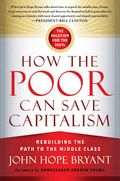 Op-ed by John Hope Bryant
Op-ed by John Hope Bryant
According to the Gallup-HOPE Index, a survey that creates an annual benchmark of the economic energy of the nation's young people, more than 4 out of 10 kids (44.7%) have not been exposed to financial literacy concepts and conversations about entrepreneurship.
That's starting to change – and it needs to if we're going to close America's financial inequality gap. With help from such entertainment icons as Quincy Jones and a growing list of other pop-culture role models, Operation HOPE has launched an ambitious campaign, called Banking on Our Future, to offer schoolchildren in grades 4-12 financial literacy and dignity classes -especially kids in economically underprivileged communities.
Based on the success of that program, here are six areas of knowledge where most kids from struggling middle class and poor backgrounds benefit most.
1. Credit rating. Kids need to know about credit because it helps them understand how to plan for large purchases responsibly. A kid with little or no money can acquire something she or he really wants. For example, it might involve borrowing money from a parent and then paying off the loan each week with chores after school.
They've seen Mom or Dad buy things with credit cards and then get in a bind trying to pay off those cards every month. Helping kids gain knowledge of how credit works – for and against them – forms the basis of responsible money management when they're out of school and on their own.
2. Budgeting. Many adults don't even know how to create a budget, which involves understanding how much it costs to live, the difference between necessities and luxuries, and changing one's saving and spending behaviors in order to stick to a basic budget. Learning budgeting also gives kids a realistic notion of the relationship between work and money, and how budgeting relates so many everyday outcomes, such as having enough for food; school supplies; clothes and shoes; birthday presents; sports, music, and entertainment; technology devices; and other important parts of kids' lifestyles.
 Watch the 4-minute movie on How The Poor Can Save Capitalism here.
Watch the 4-minute movie on How The Poor Can Save Capitalism here.
Listen to the first national interview for How The Poor Can Save Capitalism, on the Steve Harvey Morning Show here.
Join the national HOPE 100-City Book Tour here.
Posted by Natasha Eldridge, Senior Fellow, Office of the Chairman

